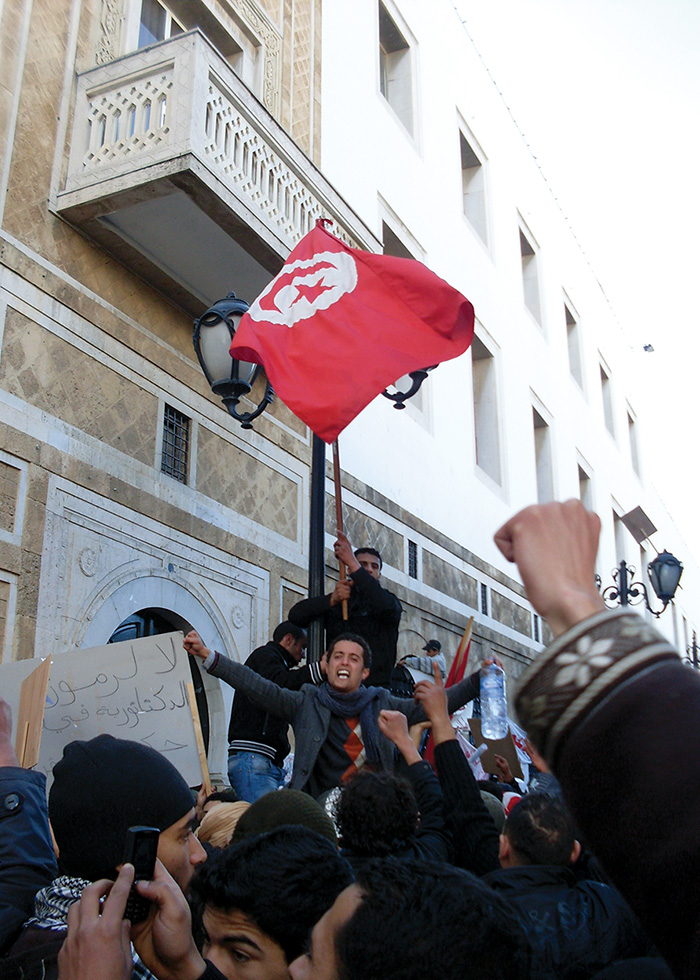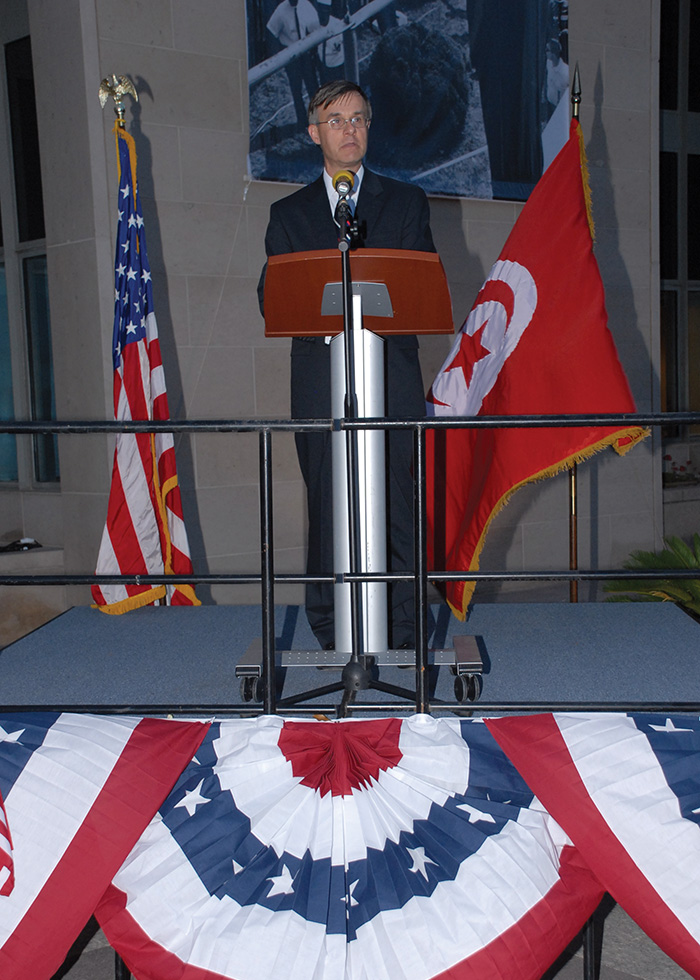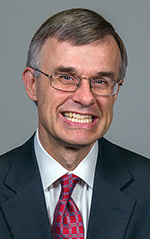What the Tunisian Revolution Taught Me
Reflections on the 10th anniversary of the Arab Spring from a career diplomat who was there.
BY GORDON GRAY

Anti-government demonstrations during the Tunisian revolution, January 2011.
Wikimedia Commons / M. Rais
Mohammed Bouazizi set himself on fire 10 years ago, on Dec. 17, 2010. His suicide put a human face on the frustration and alienation of the Tunisian people. It led to an ever-growing wave of demonstrations and forced longtime strongman Zine El Abidine Ben Ali to flee to Saudi Arabia exactly four weeks later. The Tunisian people’s success in ending Ben Ali’s 23-year reign inspired an outpouring of demands for more representative governments throughout the Middle East and beyond, and the slogan chanted during the Tunisian demonstrations (“The people demand the fall of the regime!”) was adopted by protestors from Tahrir Square to Wall Street.
Many of us serving at U.S. Embassy Tunis at the time had years of experience in North Africa and the Middle East, and yet we recall the start of the Arab Spring and Tunisia’s transition to democracy as an inspirational high point in our careers. Witnessing history was why we joined the Foreign Service in the first place. Constantly having the opportunity to learn and adapt was another reason; and serving in Tunisia when the Arab Spring began was immensely educational. I drew a dozen important lessons from the experience.
1. It’s not about you.
Tunisia was a strange place to work before its revolution. It had a friendly veneer (one clichéd description was “Syria with a smile”), but Ben Ali and his security forces ruled with an iron fist. While it would be an exaggeration to equate the Tunisian Ministry of Interior with, say, East Germany’s Stasi, Tunisians were understandably wary about interacting with foreigners, and especially with diplomats. Self-censorship was the norm. Nonetheless, I was still surprised early in my tour when all but one guest were no-shows at a lunch I hosted during a visit to Sfax, Tunisia’s second-largest city. After the revolution, a member of parliament who had been invited to the lunch apologized to me. Clearly embarrassed, he explained that the governor of Sfax had called the guests the morning of the lunch to sternly warn them against attending; the one person he did not reach was the only attendee.
Diplomats should always remember what Michael Corleone told his brother: “It’s not personal, Sonny. It’s strictly business.” Sfax’s governor was a Ben Ali loyalist—that’s why he had the job—and his point was not to slight me or the U.S. embassy. He just wanted to stay in the good graces of his ever-suspicious boss. The adage cuts both ways, of course; people seeking to curry favor may be more interested in an expedited visa interview or an invitation to the Independence Day reception than in your sparkling personality.
2. Focus on civil society.
One can’t overstate the importance of reaching out to civil society, which is what took me to Sfax in the first place. Ambassadors William Hudson and Robert Godec, my two immediate predecessors in Tunisia, not only established a dialogue with opposition figures but supported their efforts, as well. Our human rights officer was usually the only foreigner who observed the sham trials of Tunisian human rights activists. He was the sole diplomat who tried to attend the anniversary celebration of the Tunisian League of Human Rights (known by its French acronym as LTDH), the oldest such organization in the Arab world. Rings of plainclothes police stopped him from entering. They could not, however, stop news from spreading that the United States stood for Tunisian human rights. Five years later, the LTDH was one of the civil society organizations in the “Tunisian national dialogue quartet” that received the Nobel Peace Prize for its leadership in breaking the political deadlock in the early years of the country’s transition.
The most astute political operators inside the Beltway maintain good relations with both parties, knowing that those out of power one day might be on the rise another day. Diplomacy is no different. The opposition figures Jeffrey Feltman befriended when he served in Tunisia from 1998 to 2000 were cabinet ministers when he returned to Tunisia as assistant secretary for Near Eastern affairs 10 days after Ben Ali fled. The pro-democracy elder statesman I had invited to lunch before Ben Ali left Tunisia became the number two official at the Ministry of Foreign Affairs by the time the lunch took place a few days later.
3. Silence can be golden: What you don’t say is just as important as what you do say.
When the October 2009 rigged election came to its inevitable conclusion and Ben Ali was declared president with “only” 89 percent of the vote, our embassy recommended to Washington that President Barack Obama refrain from sending the routine congratulatory message. We knew that no matter how exquisitely nuanced it would have been, the regime-controlled press would have splashed it across the front pages of all the newspapers with photographs of the two leaders and headlines suggesting that Obama supported Ben Ali. Our recommendation was received with virtually no bureaucratic resistance, and no message was sent.
While a seemingly minor gesture—one that a more confident regime would have shrugged off—it apparently infuriated the Palace, which blamed its hapless ambassador in Washington and recalled him. On the other hand, while Ben Ali received congratulations from many other countries (including a warm telephone call from the French president) , Tunisian civil society noticed the absence of any message from the United States and rightly interpreted it as a sign of support and encouragement for them.
4. Expect the unexpected.
The Boy Scout motto, “Be Prepared,” is just as good advice for diplomats as it is for scouts. When I arrived in Tunisia in September 2009, I did not expect that Ben Ali would bow to overwhelming popular pressure and flee the country a mere 16 months later. Two classmates in my ambassadorial seminar may well feel the same way when they look back at their own experiences, one during the devastating earthquake in Haiti in January 2010 and the other during the “triple disaster” in Japan in March 2011. Events can always take an unexpected turn, and as diplomats, we must adapt quickly and effectively.
5. Seek as many different perspectives as possible.
The Romanian ambassador in Tunis confidently told me shortly after unrest started to spread that Ben Ali was “toast.” He had witnessed the downfall of Nicolae Ceausescu and his wife 21 years before and saw the writing on the wall for Ben Ali and Leila Trabelsi, his widely reviled wife. (Their flight to Saudi Arabia saved them from the Ceausescus’ violent end.) In another example, a first-tour officer within the embassy was an expert in assistance programs, and creatively advanced sensible proposals for U.S. support to post–Ben Ali Tunisia. Sourcing different perspectives can offer unexpected foresight and an inventiveness for how to tackle events going forward.
6. Make security your top priority.

Ambassador Gordon Gray addresses the Independence Day reception at U.S. Embassy Tunis on March 20, 2011.
U.S. Embassy Tunis
The loss of life during the Tunisian revolution was awful and avoidable, but it did not approach the number who died after Ceausescu fled Bucharest in December 1989, and is much less horrific than the death count that mounts in Syria to this day. Moreover, protests in Tunisia did not have any anti-American overtones (indeed, protestors chanted, “Yes, we can,” and held up signs reading “Game Over”), and the U.S. embassy was not a target in the lead-up to Ben Ali’s fall. Security was nonetheless our primary concern. We had to balance the realities of the situation (i.e., the lack of animus directed against the United States as a nation or Americans individually) with a sensitivity to the uncertainties of the situation and the different experiences and expectations of our staff.
Too many of us had lost colleagues during previous assignments, so we took security seriously well before December 2010. Our regional security officers had been diligent about scheduling drills on a regular basis, and we made sure everyone participated. The Foreign Service Institute led a crisis management exercise for us the month before demonstrations began, which not only helped us diagnose and remedy potential communications issues but also helped solidify cohesion in the Emergency Action Committee.
As the protests intensified, we kept senior security leaders in Washington fully informed; they, in turn, came up with creative solutions to meet our security needs and did not overreact by mandating the ordered departure of embassy personnel, which proved to be unnecessary. We conducted town hall meetings with embassy staff (with a special focus on the concerns of our Tunisian colleagues) and with the American community. We paid particular attention to the international school, which so many embassy dependents attended, and we were fortunate that our defense attaché was an active and respected member of the school board.
7. Anticipate Washington’s needs.
Understanding Washington is essential for managing its infamous 4,000-mile screwdriver. Credibility can only be earned over time, but the frustrating nature of the Ben Ali regime impeded clientelism. Thanks to our deputy chief of mission’s extensive experience on the State Department’s seventh floor and innate feel for its operations tempo, we succeeded in feeding Washington’s seemingly incessant appetite for information by adapting to its battle rhythm.
Offering creative solutions is an embassy’s most important contribution during a time of upheaval. Just 11 days after Ben Ali’s departure from the scene, large-scale demonstrations against the Mubarak regime began in Cairo’s Tahrir Square, followed soon thereafter by similar protests in Libya, Syria, Yemen, Bahrain and elsewhere. Bandwidth in Washington was tested, but our embassy’s policy recommendations were welcomed with interest rather than dismissed as “not invented here.” We provided Washington with relatively low-cost, easy-to-implement steps it could take to signal support in a cable we sent in February 2011, a message we referred to within the embassy as the “low-hanging fruit” cable.
8. Think big.
At the same time, we did not just aim for singles or doubles. One of our more ambitious recommendations was to make Tunisia eligible for the Millennium Challenge Corporation’s threshold program. While our recommendation met with initial skepticism, the White House announced Tunisian eligibility for the program less than seven months later, when President Obama hosted interim Prime Minister Beji Caid Essebsi (who had reemerged on the political stage after decades of ostracism) in the Oval Office. Three years later, the MCC announced its selection of Tunisia for a compact (i.e., a five-year grant).
9. Encourage visits; then capitalize on them.
Visits by foreign dignitaries spark the need to identify “deliverables” and, more often than not, force Washington to make tangible decisions rather than extend debates into another interagency meeting. Several programs—not just the MCC—moved forward as a direct result of the Caid Essebsi visit. Similarly, visitors from Washington afford embassies the rare opportunity to make their case directly. In February 2012, during a visit by Secretary of State Hillary Rodham Clinton, we highlighted our recommendation that the U.S. government provide $100 million in emergency budget support for the new Tunisian government. She agreed, and as soon as she boarded her plane for her next destination, she called the department to make it happen. We also won support from her and, separately, from visiting senators to initiate negotiations on a free-trade agreement. While those negotiations have yet to begin, they have broad bipartisan support in the Senate.
Engagement with Washington was generally a good idea, but we had to be alert for instances when its enthusiasm got the better of its judgment. One office pushed the idea of building an online platform connecting young Tunisian activists with aging Polish parliamentarians to discuss political transition. While we did not know how many Polish parliamentarians were fluent in Arabic or French, we figured we were on safe grounds in assessing that there were few Tunisians who spoke Polish. We were also inundated with a seemingly steady stream of diplomatic tourists, officials who wanted to come and see the aftermath of the revolution firsthand, without any clear (or stated) purpose. We succeeded in turning off some less-than-essential visits by simply asking what the objective was.
10. Seek force multipliers.
External partners often augmented the embassy’s resources, and we welcomed them. While one can reasonably question whether the military is the appropriate entity within the U.S. government to initiate development projects, we capitalized on U.S. Africa Command funding for humanitarian assistance projects in Tunisia. The concept was sound: aim for small-budget ($500,000 was the ceiling), high-impact projects throughout the country. We were able to support Tunisian nongovernmental organizations (NGOs) that fostered rural employment for women, educated autistic children, and addressed drug addiction. In addition to the obvious benefits for the Tunisian people, these programs demonstrated concrete steps the United States was taking to support Tunisia’s transition.
Events can always take an unexpected turn, and as diplomats, we must adapt quickly and effectively.
Ribbon-cutting ceremonies might not be the most original or exciting public diplomacy idea, but they helped drive home our message that the United States supported the Tunisian people—wherever they lived—and their transition to a more open political and economic system. Not all U.S. support was traditional: one of my favorite projects was the brainstorm of an embassy dependent who loved to skateboard. The public affairs section identified sports diplomacy funding, which brought skateboarders to conduct workshops in several cities and towns, notably including Sidi Bouzid, where the Arab Spring demonstrations began following Bouazizi’s self-immolation.
After the revolution, U.S. and international NGOs became excellent partners and stayed the course through the transition and beyond. The National Democratic Institute and International Republican Institute (both of which were anathema to the Ben Ali regime) were on the ground days after it collapsed. Humanitarian NGOs (and, separately, the U.S. Agency for International Development’s Disaster Assistance Response Team) brought much-needed expertise to Tunisia’s southern border when third-country workers fled the brewing civil war in Libya.
11. Don’t forget to have fun.
One of the most memorable days in my diplomatic career was Oct. 23, 2011, when Tunisia held its first truly free and fair elections. Tunisia had a wealth of election observers, from our embassy, which put together a robust observation program, to U.S. and Western NGOs, to Tunisian civil society. As a result, my participation was not necessary. But I would have kicked myself later had I not gone to polling stations that day and seen the long lines of Tunisians waiting patiently in the autumn sunlight to cast their first meaningful ballot. Some carried flags and others brought their children to mark the historic event. Moments like that are why we join the Foreign Service: to observe history in the making and, perhaps, to help nudge it in the right direction.
12. Finally, always remember that diplomacy is about people, not abstract concepts.
Shortly after Ben Ali fled the country, a prominent member of civil society who was tapped to join the national unity government explained to me the root cause of the revolution: “Poverty and unemployment exist everywhere; this happened because of a loss of dignity and a lack of dialogue.” These two factors—loss of dignity and lack of dialogue—led directly to the wave of protests and demonstrations that swept North Africa and the Middle East in 2011, and continue to this day in some countries in the region. They also help explain the widespread demonstrations in the United States against systemic racism after George Floyd was killed. Be it at home or abroad, recent history teaches us that we ignore the importance of human dignity and honest dialogue at our own peril.





